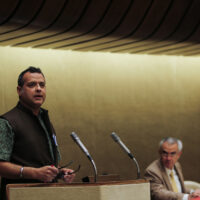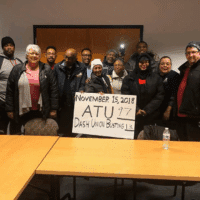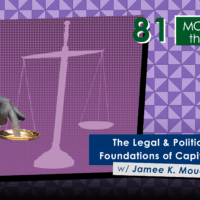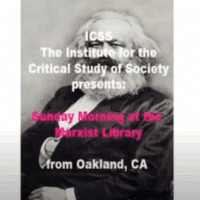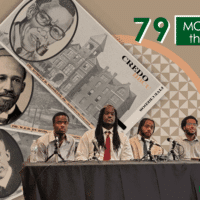-
Scholars’ letter: We support Palestine Action in their campaign against proscription’
As scholars dedicated to questions of justice and ethics we believe that Yvette Cooper’s recent proscription of Palestine Action represents an attack both on the entire pro-Palestine movement and on fundamental freedoms of expression, association, assembly, and protest.
-
The World in a Nutshell: An Interview with Vijay Prashad
VP: “Marxism, which is an ever-evolving field of analysis, is the most accurate critique of capitalism. As long as capitalism remains with us, Marxism must remain until another form of critique—better than Marxism—appears.”
-
Palestine and the Commons: Or, Marx and the Musha’a
In 1958 the assistant headmaster did the Bible reading at the morning assembly of the Karachi Grammar School (Pakistan), founded in 1848 by the Church of England. The reading from Acts 17:23 concerned St. Paul’s declaration upon seeing the Athenian monument to an unknown God. “What you worship but do not know—this is what I […]
-
Hard Truths About the US Labor Movement: An Interview with Chris Townsend
Chris Townsend has been organizing workers, conducting political work for labor unions, and teaching young workers to organize for almost all his adult life. He is, as we say, “the real deal.” While most of us opine and pontificate about labor, Chris does the dirty work. He organizes. His contributions over several decades have played […]
-
The Start of Indigenous Agriculture in North America and the American Genocide
A recent paper in Science addresses an intriguing question: Did North America have settled agriculture before the arrival of Europeans? Or were the people in what would come to be known as North America still in the hunter-gatherer stage—unlike Mesoamericans, who had advanced civilisations, such as the Mayans, Aztecs, and the Incas? The answer is […]
-
The Costs of Covid
The Covid pandemic’s onset prompted speculation that the disease had been created in a lab in China, specifically as a weapon against the United States. This new and highly contagious virus did wreak profound socioeconomic trauma and widespread suffering, borne disproportionately by the disadvantaged. Initially it caused nearly 1.2 million deaths in the United States. […]
-
Rosy skies are rare: Berlin Bulletin No. 235, July 13, 2025
Despite the hot sun, few Americans were wearing rose-colored glasses these days, but rather fear dark clouds ahead. Many feel worried, even despairing. But sometimes they could rejoice at bright spots.
-
What is the Trump Doctrine? John Bellamy Foster on U.S. Foreign Policy & the “New MAGA Imperialism”
What is MAGA imperialism? Monthly Review editor John Bellamy Foster says that, despite its feints toward anti-imperialist isolationism, President Donald Trump’s foreign policy has coalesced into a “hyper-nationalist” form of populism that rejects the U.S.’s post-WWII adherence to liberal internationalism and promotes dominance over other countries via military power rather than through economic globalization.
-
Legal & Political Foundations of Capitalism w/ Jamee K. Moudud
Heterodox economist Jamee K. Moudud returns to Money on the Left to discuss his new book, Legal and Political Foundations of Capitalism: The End of Laissez-Faire? (Routledge, 2025). The phrase “institutions matter” is a common refrain among economists, including many who have proposed progressive alternatives to free market fundamentalism. For Moudud, however, this proposition doesn’t go far enough, leaving a host of problematic assumptions unquestioned. To remedy this, Moudud draws on the Original Institutional Economics and American Legal Realist traditions to propose a robust theory of legal institutionalism or institutional political economy.
-
The Trump Doctrine and the New M.A.G.A. Imperialism — John Bellamy Foster — ICSS 20250629
The dramatic shift in the Trump led U.S. foreign policies, as seen recently in the bombing in Iran, has created enormous confusion and consternation within establishment centers of power.
-
The Empire’s Strategic Failure: How the US-Israeli Assault on Iran Accelerated Imperial Decline
The June 2025 US-Israeli military assault on Iran—featuring Israel’s Operation Rising Lion and the US Operation Midnight Hammer confronted by Iran’s defensive Operation True Promise 3—despite achieving short-term tactical victories, represents a profound strategic failure that has accelerated the US-led imperial decline and strengthened global anti-imperialist forces. Rather than cementing Western hegemony, this illegal act […]
-
Coalbrook: The Worst Mining Disaster in Africa
On the morning of January 21, 1960, 431 black and six white coal miners were entombed in a sudden collapse at Clydesdale Collieries near Coalbrook in Sasolburg, Free State Province.[1] The first rockfall took place at about 4:30 p.m. No one was killed or severely injured. While the rock still creaked and split, many of […]
-
No, You Aren’t Hallucinating, the Corporate Plan for AI Is Dangerous
Big tech is working hard to sell us on artificial intelligence, in particular what is called “artificial general intelligence.” At conferences and in interviews corporate leaders describe a not-too-distant future when AI systems will be able to do everything for everyone, producing a world of plenty for all. But they warn, that future depends on […]
-
The Black University and Community Currencies, PT. 2
In this episode, we share Part 2 of our coverage of The Black University & Community Currencies workshop. Held April 25, 2025 on the campus of Morehouse College, the workshop fostered dialogue between students, faculty, and activists about the radical possibilities of public money for higher education, broadly, and for communities at and around Morehouse, specifically. The occasion for the workshop was the conclusion of a semester in which students enrolled in Professor Andrew Douglas’s advanced political theory course at Morehouse implemented a classroom currency called the CREDO for use by Morehouse students.
-
The Migrant Genocide: Toward a Third World Analysis of European Class Struggle
Over 10,000 people died in transit to Spain in 2024 alone.[1] On June 2022, the border fence of Melilla, one of two Spanish enclaves in Morocco, was witness to a massacre that killed or disappeared over a hundred African migrants.[2] A recent BBC investigation revealed that Greek border guards systematically repeal immigrants already on Greek […]
-
A Potentially Politically Hot Summer in Puerto Rico
For today I have been asked to speak a bit about my country, Puerto Rico, and the socioeconomic crisis that is currently developing there.1 Given the time constraints, I want to provide you with a brief overview of what is being experienced there by the victims of the crisis. I want to also speak a […]
-
Pedagogy and Class Power: Reclaiming Freire in an Age of Reaction
In the early decades of the twenty-first century, education has become a frontline in the ideological struggle over the future of global capitalism. The coordinated assault on teachers, curriculum, and institutions of public learning is not an isolated culture war but a structural feature of neoliberal governance. In this context, the pedagogical philosophy of Paulo […]
-
Is China finally breaking the U.S. stranglehold?
The U.S. is in desperate economic and military “competition” with China and has lost a lot of ground fast.
-
Mandy Tröger, Richard Maxwell, Ben Scott, Sut Jhally, Des Freedman, Deepa Kumar, and Victor Pickard on Robert W McChesney – Podcast
Mandy Tröger, Richard Maxwell, Ben Scott, Sut Jhally, Des Freedman, Deepa Kumar, and Victor Pickard on Robert W McChesney
-
Israel as a tool of U.S. imperialism
A number of notable parallels run through the histories of Israel and the United States.


